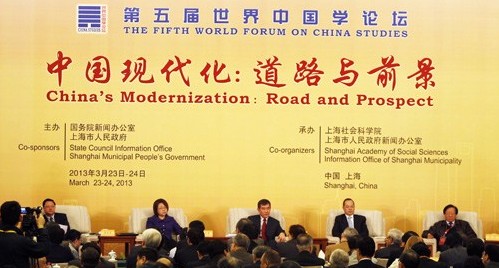As China steps onto world stage, scholars stress value of unique experience
the Fifth World Forum on China Studies held in Shanghai

The Fifth World Forum on China Studies was held in Shanghai on March 23rd-24th.
On March 23rd and 24th, the Fifth World Forum on China Studies was held in Shanghai. Co-sponsored by the State Council Information Office and Shanghai Municipal People’s Government and co-organized by the Shanghai Academy of Social Sciences (SASS) and Information Office of Shanghai Municipality, the forum drew some 300 experts on China studies from more than 20 countries. Attendees discussed the theme of “China’s Modernization: Paths and Prospects”, paying particular attention to China’s increasing international interactions.
Peaceful development and loyalty to tradition
Gustaaf Geeraerts, a professor of international relations at Vrije Universiteit Brussel and director of the Brussels Institute of Contemporary China Studies, envisions a unique path for China’s future. “China will not simply adapt to the System, nor will it supplant the west or directly challenge it. Given the broadness and exceptionality its culture’s history, China’s most likely path is, on the one hand, to take much greater responsibility, simultaneously focusing on and stabilizing domestic development, and on the other hand, to participate actively in global governance, introducing and integrating its ideas into the global order.” Geeraerts stressed that China should not be thought of as only a developing country but also as an emerging power, a role which will propel it into greater responsibility. In its foreign policy, China holds both ideal of peaceful development and maintaining the integrity of its rich cultural heritage. Its active diplomatic policy aims to foster mutual trust, cultural diversity, win-win cooperation, and a stable world order. “Maintaining a sustainable economic development is a significant challenge for China, while becoming a responsible global power is a long-term goal.”
At the forum, Liu Kang, a professor and director of the China Research Center at Duke University noted that the possibility of building a “community based on values” resonates with Chinese traditional culture, as well as with current international trends. In discussing China’s future direction, Huang Renwei, deputy president of SASS and director of the Institute of History at SASS, drew comparisons to the U.S. Where the U.S. employed both soft power and hard power to establish hegemony, Huang argues that China’s access to resources and amplification of its power can only be achieved through cooperation with other countries. “What the U.S. has done and has become is not something China can pursue; what we ultimately aim to achieve is something the U.S. has been unable to. Therefore, China cannot follow the U.S.’ path anymore,” Huang added.
Unique experience at the heart of a new scholarly paradigm
The growth of China studies overseas is an indication that it has already become an international research field. Zhang Xiping, dean of the School of Asian and African Studies at Beijing Foreign Studies University, elaborated that Chinese academia must coordinate research and collaborate with its overseas counterparts, developing the discipline on a global scale. In acknowledging the research achievements of foreign scholars, Zhang encouraged Chinese scholars to weigh the similarities and differences with their own domestic conceptions and approaches. He suggested that such a stance—critically selecting the best elements from a cross-cultural vantage point—should be geared toward the renovation of China’s contemporary academic scene. Overall, this will allow Chinese scholars to incorporate the knowledge and methods of China studies abroad in its own academic process, he concluded.
Pay attention to basics, stressed Liang Yi, director of Humanities and Social Sciences Division at Beijing Union University, commenting on methodology in China studies. In particular, Liang believes that researchers need to proceed from solid theories of history and use empirical methods in analyzing historical data.
“The West exerts a multidimensional and interactive influence on Chinese tradition. Outside of this influence, how will the mainstream of Chinese tradition continue to manifest itself and continue to evolve? How the relationship between tradition and modernization play out?” Qiao Zhaohong asked reflexively. A researcher of the Institute of China Studies at SASS, Qiao advised that in coping with these difficulties, Chinese academia should be problem-orientated. While avoiding western-centrism, it should take the fruits of western experience as guiding reference; simultaneously, while eschewing sacralizing traditional China, it should channel its focus on the unique value of China’s experience. Through this synthesis, Qiao concluded, Chinese academia can construct a new paradigm for Chinese philosophy and social sciences.
The Chinese version appeared in Chinese Social Sciences Today, No. 431, Mar. 25, 2013
Translated by Zhang Mengying
